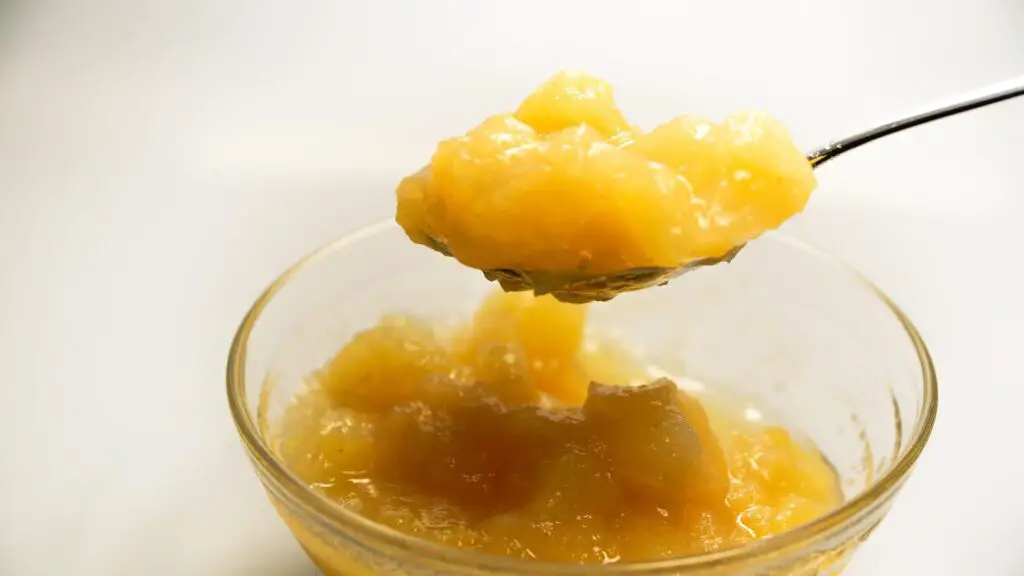Written by Amy Kaczor MS RD LDN, Registered Dietitian
Is applesauce a low FODMAP food?
Have you ever heard the phrase, “an apple a day keeps the doctor away?” Whether red, green, or yellow, apples are a crisp and juicy fruit we all enjoy. Similarly, applesauce is a convenient and refreshing snack, side dish, or topping. But is applesauce (and apples) low in FODMAPs?
According to the Monash University FODMAP Diet app, apples are typically high in fructose and sorbitol. Unfortunately, these sugars are both FODMAPs and can cause an aggravation of symptoms for those who are following the low FODMAP diet. Monash University specifies that only two teaspoons of a granny smith apple, for example, would be considered low enough in FODMAPs to be tolerated well.
Therefore, applesauce also must be severely restricted. In fact, the leading FODMAP researcher, Monash University, has not yet tested applesauce for FODMAPs to determine a tolerable serving size.
What are the health benefits of applesauce?
Apples and applesauce are significant sources of dietary fiber, which aids in digestion and supports gut health. Additionally, apples contain many antioxidants, which may have anti-inflammatory properties in the body. Apples also contain ascorbic acid, known as vitamin C. Vitamin C has so many functions in the body, including supporting immune function.
Summary
We hope this post answers your questions about the low FODMAP diet and applesauce as a part of the low FODMAP diet. Stay tuned for more posts about the low FODMAP diet and low FODMAP foods!
Stay tuned for more posts about low FODMAP foods. Also, check out our other pages for more information on managing digestive health.
References
Veloso, H. G. (n.d.). FODMAP diet: What you need to know. Johns Hopkins Medicine. Retrieved April 19, 2022, from https://www.hopkinsmedicine.org/health/wellness-and-prevention/fodmap-diet-what-you-need-to-know/

What are the benefits of a low FODMAP diet?
A low FODMAP diet is an eating plan that is used to help manage symptoms of irritable bowel syndrome (IBS). The diet is intended to restrict the consumption of foods that include fermentable oligosaccharides, disaccharides, monosaccharides, and polyols (FODMAPs). These are types of carbohydrates that are poorly absorbed in the gastrointestinal tract and can cause gut fermentation, bloating gas, and abdominal pain. Studies have shown that a low FODMAP diet can reduce IBS symptoms in as many as 70% of people with the condition.

The diet is usually implemented under the guidance of a registered dietitian and is not meant to be followed long-term. People with IBS who want to try a low FODMAP diet should work with a Registered Dietitian Nutritionist (RDN) to individualize the plan and ensure they are meeting their nutrient needs. Some foods that are high in FODMAPs include wheat, barley, dairy products, certain fruits and vegetables (such as garlic, onions, and apples), and artificial sweeteners. There are many delicious and nutritious low FODMAP recipes available online and in cookbooks.
How can low FODMAP diet help with digestive issues?
Foods that are high in FODMAPs can cause digestive issues like gas, bloating, and abdominal pain for people with Irritable Bowel Syndrome (IBS). The low FODMAP diet is a way of eating that avoids foods that are high in FODMAPs. When people with IBS eat foods that are high in FODMAPs, it can trigger their symptoms. A low FODMAP diet can help to reduce or eliminate these symptoms.
There are a few different ways to do a low FODMAP diet. One is to avoid all foods that are high in FODMAPs. Another is to eat only small amounts of foods that are high in FODMAPs. And the third is to eat a mixture of both low and high FODMAP foods. The best way to figure out which approach is best for you; is to work with a registered dietitian who is familiar with the low FODMAP diet. They can help you figure out which foods you should avoid and how much of each food you can eat without triggering your symptoms. So if you’re struggling with digestive issues, a low FODMAP diet might be something worth looking into.
If you are considering starting a low FODMAP diet, it is important to speak with your doctor first. They can help you to understand the potential risks and benefits of the diet, and make sure that it is right for you.
Read More:
- Are Cranberries Low FODMAP?
- Is Broccoli Low FODMAP?
- Are Potatoes Low FODMAP?
- Is Brown Sugar Low FODMAP?
- Are Grapes Low FODMAP?